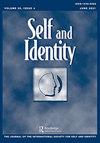Why is authenticity associated with being and acting extraverted? Exploring the mediating role of positive affect
IF 2.1
4区 心理学
Q3 PSYCHOLOGY, SOCIAL
引用次数: 0
Abstract
ABSTRACT Extraversion is linked to higher levels of authenticity. Why? Across four studies, we examined positive affect as a potential mediator. In Study 1 (N = 205), we tested our mediation model at the trait level. Then, focusing on the within-person state level: Study 2 (N = 97) involved a 10-week lab-based experience sampling protocol; Study 3 (N = 147) involved a preregistered week-long daily-life experience sampling protocol; and Study 4 (N = 129) involved a two-week naturalistic experience sampling protocol. In all four studies, positive affect explained moderate to high proportions of the effects of extraversion on authenticity (Study 1 = 29%, Study 2 = 38%, Study 3 = 87%, Study 4 = 86%). We discuss several theoretical interpretations.为什么真实性与外向的存在和行为有关?积极情感的中介作用探析
摘要Extraversion与更高级别的真实性联系在一起。为什么?在四项研究中,我们考察了积极情感作为一种潜在的中介。研究1(N = 205),我们在特质水平上测试了我们的中介模型。然后,关注人内状态水平:研究2(N = 97)涉及为期10周的基于实验室的经验采样协议;研究3(N = 147)涉及预先注册的为期一周的日常生活体验采样方案;和研究4(N = 129)涉及为期两周的自然体验采样方案。在所有四项研究中,积极情感解释了外向对真实性的中等到高比例影响(研究1 = 29%,研究2 = 38%,研究3 = 87%,研究4 = 86%)。我们讨论了几种理论解释。
本文章由计算机程序翻译,如有差异,请以英文原文为准。
求助全文
约1分钟内获得全文
求助全文
来源期刊

Self and Identity
PSYCHOLOGY, SOCIAL-
CiteScore
5.10
自引率
5.00%
发文量
26
期刊介绍:
Work on self and identity has a special place in the study of human nature, as self-concerns are arguably at the center of individuals" striving for well-being and for making sense of one"s life. Life goals develop and are influenced by one"s view of what one is like, the way one would ideally like to be (or would like to avoid being), as well as one"s perceptions of what is feasible. Furthermore, conceptions of self and the world affect how one"s progress towards these goals is monitored, evaluated, redirected, re-evaluated, and pursued again. Thus, the “self” as a construct has far-reaching implications for behavior, self-esteem, motivation, experience of emotions and the world more broadly, and hence for interpersonal relationships, society, and culture.
 求助内容:
求助内容: 应助结果提醒方式:
应助结果提醒方式:


